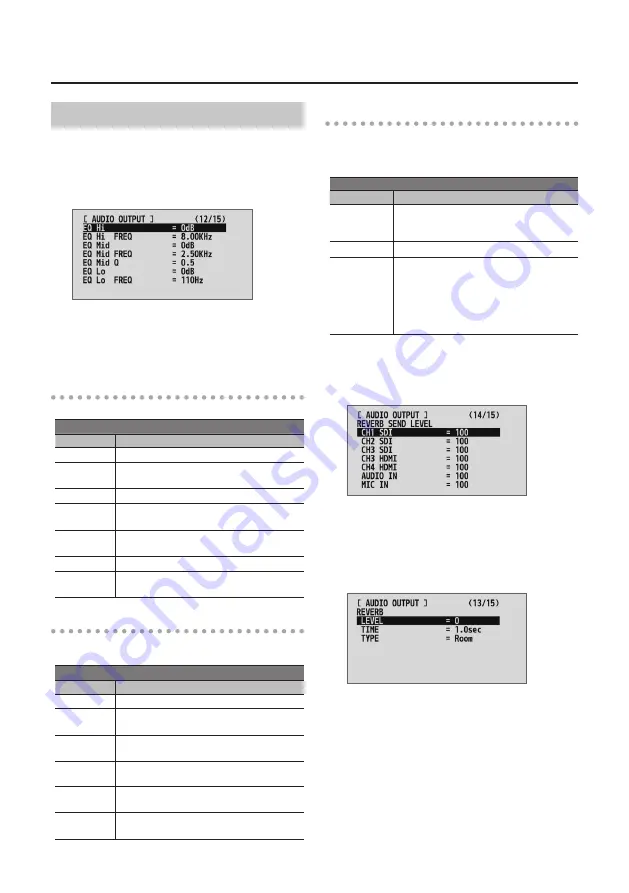
28
Audio Operations
Applying Effects to Output Audio
This applies effects and adjusts the sound quality for
output audio.
1.
Display the AUDIO menu (p. 12), then select the
effect menu item you want to use.
* For more information about effects, refer to the following
section.
2.
Use the A/B fader to adjust the setting value.
3.
Equalizer (EQ)
This adjusts the sound quality for each frequency band.
MASTER OUT (page 12/15)
Menu item
Explanation
EQ Hi
This boosts or attenuates the high band.
EQ Hi FREQ
This adjusts the center frequency when
changing the sound quality in the high band.
EQ Mid
This boosts or attenuates the middle band.
EQ Mid FREQ This adjusts the center frequency when
changing the sound quality in the middle band.
EQ Mid Q
This adjusts the width of the frequency band
when boosting or attenuating the middle band.
EQ Lo
This boosts or attenuates the low band.
EQ Lo FREQ
This adjusts the center frequency when
changing the sound quality in the low band.
Mastering (MASTERING)
This adjusts the acoustic characteristics and tone
quality.
MASTER OUT (page 15/15)
Menu item
Explanation
MASTERING This switches mastering on and off.
NS
This adjusts the degree of application of the
noise suppressor.
ENHANCER
This adjusts the degree of application of the
enhancer.
Hi
This suppresses high-frequency distortion and
adjusts the sound to have sustained tones.
Mid
This suppresses midrange distortion and
adjusts the sound to have distinct tones.
Lo
This suppresses low-frequency distortion and
adjusts the sound to have stable tones.
Reverb (REVERB)
This adds lingering reverberations to the audio.
You can apply reverb to audio input via AUDIO IN,
MIC, SDI IN, and HDMI IN.
MASTER OUT (page 13/15)
Menu item
Explanation
LEVEL
This adjusts the return level from reverb
of the audio. A setting of “0” results in no
reverb applied.
TIME
This adjusts the length of the reverb.
TYPE
This specifies the type of reverb.
ROOM:
HALL:
Produces the natural reverberations
of a highly resonant room.
Produces reverberations like that of
a performance in a concert hall or
other such space.
1.
Display the AUDIO menu (p. 12), then select the
input audio where you want to apply reverb
using “REVERB SEND LEVEL.”
2.
Use the A/B fader to adjust the amount of audio
sent to reverb.
Repeat steps 1 and 2 as needed to individually
adjust the amount of reverb applied.
3.
At the AUDIO menu, select “LEVEL” under
REVERB.
4.
Use the A/B fader to adjust the amount of audio
returned from reverb.
This adjusts the depth of overall reverb applied
while maintaining the balance in the degree
of reverb applied to the individual input audio
streams.
5.
Содержание V-1SDI
Страница 39: ...39 For EU Countries For China ...



























